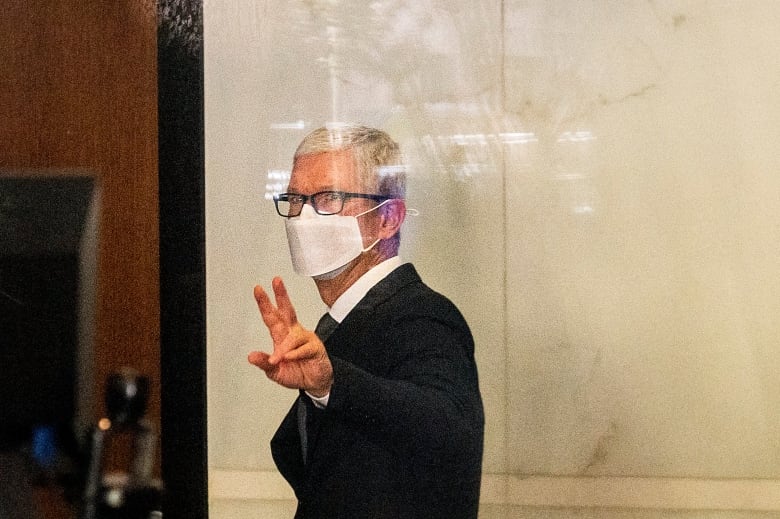Apple ordered to loosen App Store grip as critics call for reform
Judge rules partial victory to Fortnite maker Epic in landmark antitrust suit

A U.S. federal judge stopped short of labelling Apple Inc. an illegal monopoly on Friday, but in a closely watched ruling struck down a core part of its App Store rules, forcing the company to allow developers to send their users to other payment systems.
The ruling marks a win for Fortnite creator Epic Games and other app makers and provides a roadmap for similar claims against the iPhone maker in the future, legal experts said.
But Judge Yvonne Gonzalez Rogers did not require Apple to let app makers use their own in-app payment systems, one of Epic's top requests, and allowed Apple to continue to charge commissions of 15 per cent to 30 per cent for its own in-app payment system.
Epic said it would appeal the ruling, with CEO Tim Sweeney tweeting that the ruling "isn't a win for developers or for consumers."
Ruling on an antitrust case brought by Epic Games, creator of the online game Fortnite U.S. District Judge Yvonne Gonzalez Rogers said Epic did not present sufficient evidence of Apple having unlawful monopoly power in the relevant market, which she defined as "digital mobile gaming transactions."
But the California judge made clear that the decision was limited to the facts before her.
"While the Court finds that Apple enjoys considerable market share of over 55 per cent and extraordinarily high profit margins, these factors alone do not show antitrust conduct," Gonzalez Rogers said. "The Court does not find that it is impossible; only that Epic Games failed in its burden to demonstrate Apple is an illegal monopolist."
The judge did find that Apple's rules on its lucrative App Store business violated California state competition laws.
Questions unsettled
The question of whether Apple abused monopoly power "remains very much unsettled," said Joshua Paul Davis, a professor of antitrust law at the University of San Francisco School of Law.
"Given how controversial these issues are right now, I would expect this not to be the final say," he said.
In her ruling, Gonzalez Rogers noted that Epic Games had "overreached" in a trial earlier this year by trying to define
the relevant market as all app distribution and in-app payments on iPhones.
"As a consequence, the trial record was not as fulsome with respect to antitrust conduct in the relevant market as it could have been," Gonzalez Rogers said.
Apple's legal team said it was still reviewing whether to appeal the decision.
"We're extremely pleased with this decision," Apple's General Counsel Katherine L. Adams told reporters. "It underscores the merit of our business, both as an economic and competitive engine."
Valarie Williams, a partner at law firm Alston & Bird, called Gonzalez Rogers' decision a "road map" to future plaintiffs pursuing monopoly claims against Apple.
Future plaintiffs could bring a case that adopts Gonzalez Rogers's market definition and introduces additional evidence, Williams said.
Sam Weinstein, a professor of antitrust law at Cardozo School of Law, agreed the judge's ruling could encourage other market participants to learn from Epic's case and try to launch a stronger blow against Apple.
Investor fears
Apple shares dropped on news of the ruling and closed more than three per cent down at $148.97 US on Friday, reflecting investor fears that the ruling would siphon away billions of dollars in annual revenue from the company.
The legal battle targeted commissions of up to 30 per cent that Apple charges on digital transactions within apps. Such transactions can include everything from Netflix or Spotify subscriptions to the sale of digital item such as songs, movies or virtual tchotchkes for video games.
Epic cast that highly lucrative fee as a price-gouging tactic that wouldn't be possible if competing stores were allowed to offer iPhone apps.

Gonzalez Rogers also dealt Epic a blow by ruling that the game maker breached its contract with Apple when Fortnite added a non-Apple payment system to its app. That defiance prompted Apple to oust Fortnite from its app store 13 months ago, triggering Epic's lawsuit.
She ordered Epic to pay Apple nearly $3.7 million US, or 30 per cent of the revenue it collected while violating Apple's commissions.
Epic, a privately held company based in Cary, N.C., didn't immediately respond to a request for comment. But Epic CEO Tim Sweeney denounced the ruling in a tweet, writing that it "isn't a win for developers or for consumers."
He said Fortnite will return to Apple's app store once it can offer competitive in-app payments.
"We will fight on," he added in a subsequent tweet.
FACTBOX: Highlights from the case

Epic CEO Tim Sweeney said Apple exercised "total control over" all software on iOS when he testified in May, and that he knew he was breaking Apple's App Store rules by putting Epic's own in-app payment system into the game. Apple countered it was simply trying to protect the security and privacy of its one billion iPhone users.
Experts battle
Experts make the case that Apple's iPhone users are so loyal that the device constitutes a single-brand market. Apple has long argued that it is a minority player in thriving markets, but a decision otherwise could have far reaching implications for its business.
Apple made at least $100 million — and likely more — from Fortnite in just two years, showing how lucrative the App Store model can be for the iPhone maker.
With files from The Associated Press
.png)